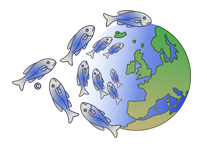

Cellaria sinuosa is a bryozoan forming ivory colonies of up to 10 cm high. They have a bushy shape with cylindrical branches divided in a dichotomic way. Each branches develop from a dark joint giving the colony an articulated appearance. They are covered on the whole surface with zooids regularly set in longitudinal series. The whitish lophophores are quite invisible to the eye. Colonies live attached to rocks, gravels or shells between 10 and 100 meters deep.
Cellaria sinuosa is reported in the Atlantic Ocean, the Englih Channel, the North Sea and the Mediterranean Sea.
Source : World Register of Marine Species
Biota (Superdomain)
Animalia (Kingdom)
Bryozoa (Phylum)
Gymnolaemata (Class)
Cheilostomatida (Order)
Flustrina (Suborder)
Cellarioidea (Superfamily)
Cellariidae (Family)
Cellaria (Genus)
Cellaria sinuosa (Species)
Dichotomic : divided in two, in 'Y' shape.
Zooid : individual, single animal.
Lophophores : crown of tentacles.
Text : Anne Bay-Nouailhat © 2007 - 2026.
Photos : ©
Maurice Loir. Published with his kind permission.
Websites and reference works : Consult bibliography
Image satellite: © Esri, DigitalGlobe, GeoEye, Earthstar Geographics, CNES/Airbus DS, USDA, USGS, AeroGRID, IGN, and the GIS User Community.
Données de distribution : Cellaria sinuosa (Hassall, 1840) in GBIF Secretariat (2019). GBIF Backbone Taxonomy. Checklist dataset https://doi.org/10.15468/39omei accessed via GBIF.org on 2026-03-05.
Source : World Register of Marine Species
Biota (Superdomain)
Animalia (Kingdom)
Bryozoa (Phylum)
Gymnolaemata (Class)
Cheilostomatida (Order)
Flustrina (Suborder)
Cellarioidea (Superfamily)
Cellariidae (Family)
Cellaria (Genus)
Cellaria sinuosa (Species)
Dichotomic : divided in two, in 'Y' shape.
Zooid : individual, single animal.
Lophophores : crown of tentacles.
Text : Anne Bay-Nouailhat © 2007 - 2026.
Photos : ©
Maurice Loir. Published with his kind permission.
Websites and reference works : Consult bibliography
Bay-Nouailhat A., October 2007, Description of Cellaria sinuosa, [On line] https://european-marine-life.org/17/cellaria-sinuosa.php, consulted on 2026 March 05.
Author

Chargée d’études en environnement marin
Plongeuse professionnelle - Naturaliste
© Mer et littoral 2004-2026 - All rights reserved
The texts and images on this website are not free of rights and cannot be copied and/or used without the agreement of their respective authors.